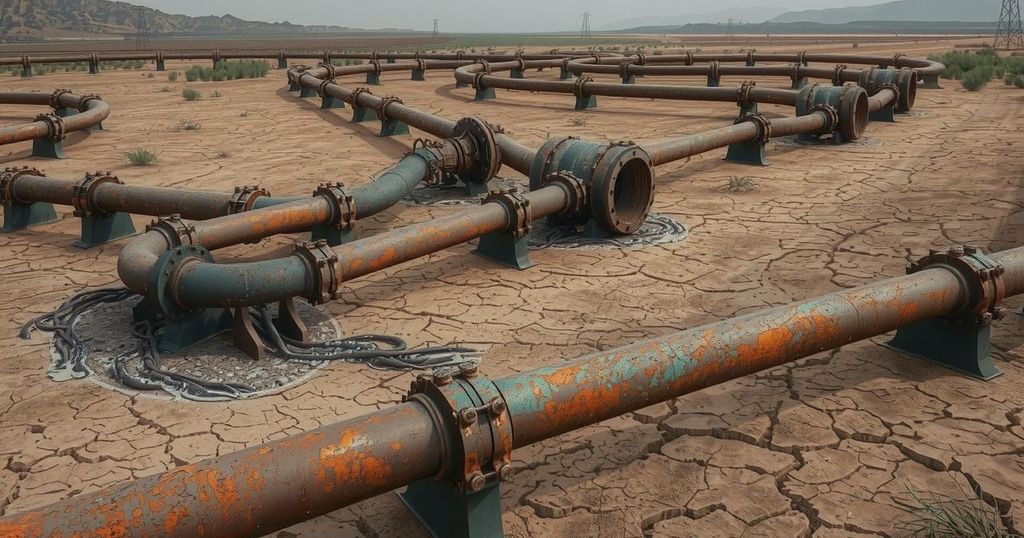Ghana Water Limited’s aging pipelines are adversely impacting water quality, necessitating government investment to improve infrastructure. Over half of the produced water is lost before reaching consumers, with an increasing reliance on donor funding that undermines sustainability. Emphasis on public-private partnerships and innovative waste management strategies is crucial for addressing these challenges and ensuring safe water access.
Mr. Ibrahim Musah, the Head of Strategy, Policy and Campaigns at WaterAid Ghana, has expressed concerns regarding the obsolescence of Ghana Water Limited’s (GWL) distribution pipelines, which adversely impacts water quality across urban areas. He noted that aging infrastructure leads to frequent rust and pipe bursts, necessitating continuous repairs and disruptions to water supply. Mr. Musah urged the government to allocate investments to modernize the water distribution systems and enhance service delivery.
He emphasized the need for significant financial input to address these infrastructural challenges, as GWL requires substantial funding to replace deteriorating pipelines and ensure a reliable supply of safe water. The inefficiencies in infrastructure maintenance have led to excessive water loss, with over half of the water produced not reaching consumers. With rising demand in urban regions, improvements are critical to delivering sustainable water services.
In discussions with journalists in Accra, Mr. Musah revealed that Ghana’s Water, Sanitation, and Hygiene (WASH) sector is primarily funded by donors, with a worrying trend of decreasing government funding. In 2022, donor contributions made up 73% of the sector’s budget, which increased to 92% in 2023, while government funding dropped to 8%. He cautioned that continued reliance on external funding is neither sustainable nor conducive to achieving universal WASH access or the Sustainable Development Goals (SDGs).
Mr. Musah advocated for the government to take more responsibility in financing the WASH sector through partnerships with the private sector, particularly leveraging Public-Private Partnerships (PPP). He highlighted that urban regions like Tamale, Cape Coast, Ho, and parts of Accra face daily water shortages due to demand exceeding supply. Additionally, rural communities necessitate further investment for adequate water supply solutions.
The intricate challenges in the water sector are exacerbated by illegal mining activities affecting GWL intake points, especially in several regions of Ghana. Meanwhile, the Community Water and Sanitation Agency (CWSA) requires sustainable funding for its operational reforms to enhance rural water delivery. Furthermore, investments in hygiene infrastructure at public sites, such as markets and recreational areas, are also essential to promote public health.
Mr. Musah lamented that progress made in hygiene initiatives since the COVID-19 pandemic is diminishing, risking both water quality and public health due to conditions that promote mosquito breeding. In terms of sanitation, he called for better separation of organic waste from inorganic waste to facilitate recycling and resource recovery. He exemplified how organic waste could generate biogas and fertilizers, reducing reliance on imports.
He further advocated for the circular economy principles that can convert organic waste into valuable products, similar to successful initiatives seen in other countries. Mr. Musah stressed that engaging the private sector is vital for financial and technical support, suggesting that a favorable government environment could lead to employment opportunities and a brighter economic future for all.
The challenges confronting Ghana’s water supply system, primarily due to aging infrastructure at Ghana Water Limited, necessitate urgent government intervention and increased funding. With over half of water production lost before consumption, the reliance on donor funding is unsustainable for long-term WASH goals. Mr. Ibrahim Musah emphasizes the importance of public-private partnerships, robust financing strategies, and innovative waste management practices, including recycling and circular economy principles, to secure a reliable and safe water supply for all citizens.
Original Source: www.gbcghanaonline.com






